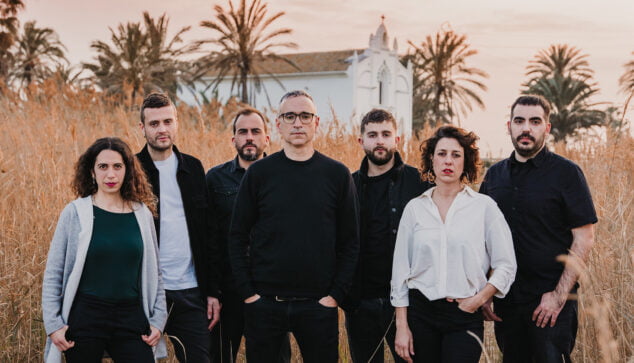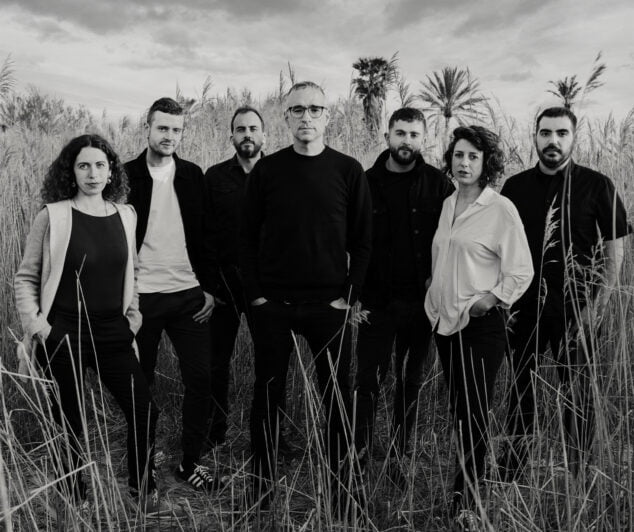The next Nou d'Octubre will perform in Dénia one of the most important voices of Valencian culture in recent decades. We are talking about Xavi Sarrià, responsible together with his old group, Obrint Pas, for the popularization of music in Valencian among young people, starting a music scene without equal in the entire State.
After 20 years, Obrint Pas announced his retirement from the stage, which led his former vocalist to focus on writing and other solo projects. He arrives in Dénia on such an important date with a documentary concert willing to value the Valencian struggles and to reconnect with the public of a region for which he feels special devotion. For this reason, we got in touch with him to talk about his proposal, the Valencian mobilizations, our black past ... but also about the hopeful present and future, as well as the relevance of our region in recent movements.
QUESTION. You come to present Do not turn off the stars. A documentary concert. What is this project about?
ANSWER. It is a concert that is born from the song that we made for Guillem's mort, the movie. The song was already trying to recover our stories from popular struggles, and in the concert we have tried to give voice to those testimonies, of our stories of resistance and struggle in difficult times.
It is a concert interspersed with audiovisual elements that, somehow, they participate between song and song.
Q. The film you are talking about, La mort de Guillem, is about the murder of Guillem Agulló in 93. But much of what you see in the film is too reminiscent of more current conflicts. Why do we seem to be the same almost 30 years later?
R. I think that he fascism it has enjoyed much impunity in our country. Guillem's assassination was a flagrant example, but also the assassination of Miquel Grau and all the extreme right-wing violence that has been suffered in País Valencià. This impunityUnfortunately, it continues and today it is amplified by the new hate speech that we see continuously, the new aggressions in the streets, the legitimation that certain sectors give to all this ...
The truth is that it is sad, but the whole struggle of our people and our people is also hopeful, which is what we want to value in this concert.
Q. Do you think that this is especially affecting our territory or is it growing, or returning, everywhere equally?
R. Fascism is returning to all of Europe and throughout the Spanish State, as we saw the other day in Chueca, where they walked with impunity. Here we have suffered a lot. The stories we teach at the concert are a sample of everything that so many generations have suffered. But it is also putting the opposite on the table: all the work, the struggle, everything that so many people of our land have done to stand up to fascism and win a future of freedom.
Q. It is said a lot about "history repeats itself" and watching some scenes from the film, which are so reminiscent of today, it seems so. I cannot get out of my head, for example, the trial that we see, with such a clearly positioned justice.
R. The truth is that the film shows that moment of the trial, which is very beast, in which it was tried criminalize family and friends. They tried to cover up everything that had happened by presenting it as a simple fight and even accusing Guillem when he had been murdered.
The truth is that everything we have suffered is sad and, as you say, history continues to repeat itself. But despite all that, our people have always been fighting, persevering and defying fear. The fear that sentíHe has not beaten them yet. The fear was there, but the desire to change things was stronger. That is what we want to value in these days of multiple crises that we are experiencing.
"The dates indicated are important to celebrate who we are and where we come from"
Q. You present it here precisely on the Nou d'Octubre. Do you think that now, because of what we were talking about, this type of celebration is more important?
R. I think it is a very complicated moment that we are living, and that the Nou d'Octubre it becomes a day to celebrate our struggles and say on the street that we are alive, as the anti-fascist demonstration does in Valencia, I think it is very necessary. Luckily, there are a lot of people taking to the streets and filling the concerts. That is the sign of our people.
P. In Dénia, the Nou d'Octubre has always had a vindictive character, I imagine that as in all towns, but more limited to purely political acts, talks, more traditional events such as dance, but doing rock concerts in Valencian was something that we had forgotten. Is it important to bet on these scenarios on such an important date?
R. I think so, despite the fact that concerts in our language have to be held all year long, not only on specific dates. Our language has to occupy everyday settings and spaces. But also the designated dates are important to celebrate who we are and where we come from.
Q. I imagine that it is also a simpler way of putting the young population in contact with our culture and making them more involved in this celebration.
R. Youth is our future. Fortunately, young people are very animated to participate and take to the streets. It fills me with joy to see so many people going out and participating in the struggles and, in my case, going to concerts. I think it is vital and fortunate that we have all this youth today.
P. You will play in the long COVID era. What do you miss the most from the pre-pandemic concerts?
R. Obviously, the contact with people, that they are standing dancing without restrictions ... Now it seems impossible for the whole public to get together, hugging, enjoying and singing at the top of our lungs, and not all of us being moderating.
Still, we have tried to make a format that can work in times of a pandemic.
Q. Anyway, you return to the Marina, which is a region for which, if I am not mistaken, you feel devotion. Why is important the Marina Alta for the Valencian music scene?
R. The Marina is a benchmark. It is a territory where we started many concerts in our time. We left Valencia and went to Marina and we met many people like us, those towns at parties, those first concerts that gave us life ... That is why we have this affection for their landscapes, their emotions, the memories that we leave there ... In fact, the song If I tank els ulls de No Obrint It is based on a concert in the Navy.
That is why it is, in short, so important to us, because of what it has meant for music in our language and for all that it continues to be and represent.
P. You also return to Dénia, where you played for the last time at the Rock a la Mar festival in 2006 with Obrint Pas.
R. Yes, there in the port (laughs). What used to be done in Els Poblets, in l'Almadrava ... I remember it very exciting. In fact, now I remember all the concerts of the past and it seems another world (laughs). All the people dancing ...
That emotion and that time mark, everything that we lived during those years in which doing things in Valencian was very complicated. There was not so much institutional support nor did we appear in the public media. Concerts were held because young people filled the venues, and that was very exciting for us.
Playing in the capital of the Navy ... It was a symbol and it was very important to us.
P. Do you want to meet again with the public here?
R. Yes, yes, I am looking forward to the concert. When they told me, I was very excited about everything he said. So it symbolically means the capital of the Navy, where it will be the second time you play.
P. Well, we will see each other in the Nou d'Octubre, with masks and seated, but we will see each other and enjoy, which is the important thing. It has been a pleasure.
R. It will end up happening, but it seems that it has already been all life (laughs). See you, thank you very much.









We'll see. Whether you want to pay tribute to a murdered person, or you want to denounce the injustice of a trial, but doing it this way is to confuse concepts, which actually causes the whitewashing of the guilty. 40 years voting for the PP in the Valencian Community, absolute majority, total corruption and the people continued voting for them until the entire system exploded. It is not fascism that has enjoyed and enjoys impunity, it is the enormous corruption of the system, now it has become fashionable to use the word "fascism" for everything, distorting its meaning and leaving it to nothing. Now calling someone a fascist sells that is sad because it diverts attention from widespread corruption. in which all political parties are based.
On the other hand, if they want to base their music on a kind of political protest song, fine, but in reality, all they do is take advantage of what they sell today. Pure marketing but if it works for them, then great. 40 years voting for the PP could make a song with that theme and a good video at the Palau de las Ciencias, the F1 circuit or at the "agüelo" airport in Castellón for example.
But if these are the same as those against whom they say they fight, the fascists, they say. The same hateful faces, the same messages of violence and intolerance. Only the symbols change, the territory from which they want to exclude those who do not think like them, that is, nationalists, the flags. They claim to be anti-fascists, but they are communists, who, as history has shown us, pick up straws, and move with the same impunity that others say they have ... From every troubled river